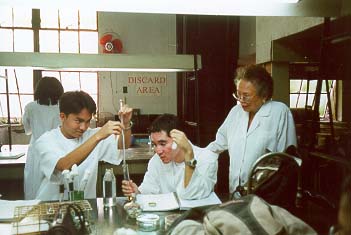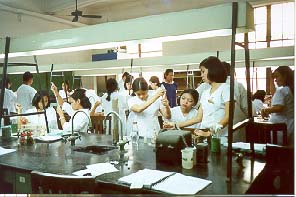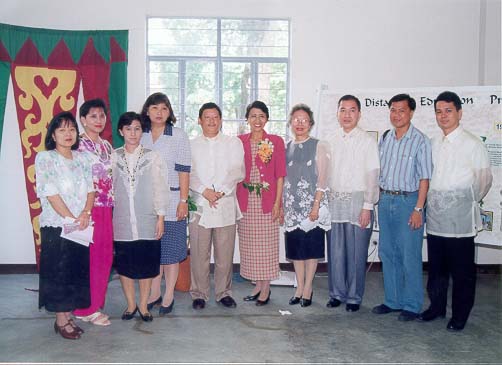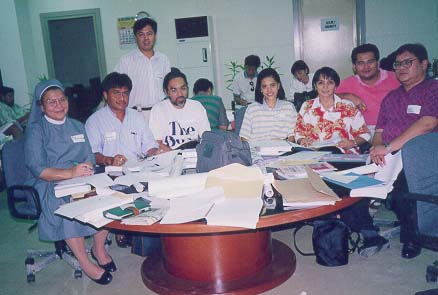|
|
|
|
SEAMEO TROPMED Regional Centre for Public Health
Manila
|
|
|
|
The College of Public Health (CPH), established
in 1927, is a unit of the University of the Philippines Manila (UP) and
concurrently serves as the SEAMEO TROPMED Regional Centre (TROPMED/Philippines)
in the fields of public health, rural medicine, hospital administration,
environmental and occupational health, health policy and management.
The primary services of teaching, research and extension are provided by
regular full-time faculty from CPH and professorial lecturers from other
units of the University of the Philippines System, other government and
non-government institutions.
 Mission/Goals:
The
CPH-UPM shall constantly strive to become an outstanding and relevant
institution of higher learning. Thus, it shall provide the highest quality
of advanced instruction, professional education, training, basic and applied
research, and community
services, thereby produce outstanding scholars,
practitioners and leaders in health systems development. In this
endeavor,
equal importance to the content and process of health systems
development will
be
given.
Mission/Goals:
The
CPH-UPM shall constantly strive to become an outstanding and relevant
institution of higher learning. Thus, it shall provide the highest quality
of advanced instruction, professional education, training, basic and applied
research, and community
services, thereby produce outstanding scholars,
practitioners and leaders in health systems development. In this
endeavor,
equal importance to the content and process of health systems
development will
be
given.
As a relevant institution,
the CPH-UPM shall continuously be involved and actively participate in health
policy studies and development. It shall make a stand on major issues
related to health.

Objectives:
UPCPH aims
to contribute to health systems development through:
| Education and training of scholars, practitioners and leaders for the practice of public health and its specialties through its different degree and continuing education programmes. |
| Research to develop appropriate and cost effective methods of promoting health and solving health problems. | |
| Community and extension services to improve the practice of public health. | |
| Participation in health policy studies and development. |
|
Collaborative
programmes with other academic, research and service organizations which
may be national, regional or international. |
Assistance from
the Federal Republic of Germany (FRG) through GTZ (German Technical Cooperation
Agency) included a comprehensive institutional strengthening project for
the promotion of teaching and research at UPCPH.

Other institutional capabilities:
| distance education | |
| regional linkages in tropical disease research | |
| urban health and nutrition research | |
| research and training in AIDS epidemiology | |
| preventive dentistry | |
| health promotion and health education |
Training Programmes:
Degree Programmes
|
Applicants for admission to graduate
degree programmes must present evidence of scholastic ability and potential
for profitable study at a graduate level. A TOEFL score of at least 500
or its equivalent is required.

Undergraduate:
|
|||||||||||||||
Short-Term Courses:
|
Structured training courses of 1-2 weeks
duration are offered on demand and deal with a wide range of topics within
the expertise of UPCPH.
| National Sanitarians Training Center | |
| Postgraduate Course in Occupational Health and Safety | |
| Diagnostic Parasitology | |
| Diagnostic Mycology | |
| Research Methods | |
| Meta-Analysis | |
| Strategic Planning and Management | |
| Project Management and Planning | |
| Hospital Administration | |
| Management Information System | |
| Human Resource Management | |
| Quality Management (Basic & Advance) | |
| Hospital Financial Management | |
| Health Care Executives' Course |
Research:
Several
researches were completed/are on-going on topics such as traffic-related
injuries, standards of care in diabetes, HIV prevalence differentials,
reproductive health, syndromic approach for STD case management, effects of
coconut on human lipid levels, deafness/hearing impairment among workers,
mosquitocidal microorganisms, genetically modified organisms, genetic diversity
of hepatitis B virus, leptospirosis control, plants in
anti-microbial/anti-cancer therapy, comparison of anti-parasitic agents, mass
chemotherapy in parasitic infections, staffing pattern of rural health units,
district health systems, and external evaluation of life-style diseases.

Address
for Inquiries:
